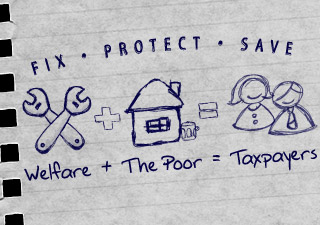Commentary

Fix Welfare to Protect Poor, Save Taxpayers
Despite prevalent evidence showing the current welfare system does irreparable harm by trapping families and children in a cycle of poverty, presumptive Republican vice-presidential nominee Rep. Paul Ryan’s plan to save the social safety net from unsustainable and unfulfilled promises is being myopically criticized as a mean-spirited attack on seniors and the poor. Unfortunately for naysayers, the facts are getting in the way of polarizing partisan politics.
Today, more Americans live in economic distress than at any point since the well-intended “War on Poverty” began. Here in Pennsylvania, the poverty rate increased nearly 50 percent over the past decade, through both good and bad economic times.
Undoubtedly, rising poverty didn’t happen because funding was slashed. In fact, it occurred in spite of massive spending increases. Over the past 10 years, Pennsylvania welfare spending grew at twice the rate of inflation and 20 percent faster than taxpayers’ income. For the first time in history, Public Welfare has now eclipsed Education as the largest department in the state budget with more than 40 cents of every tax dollar going to support welfare programs.
It simply begs the question: Why has the welfare state failed so completely?
For starters, millions of welfare dollars never reach the truly needy because some unscrupulous members of our society are getting rich off the poor. Take KRA, a government contractor providing employment services for welfare beneficiaries. KRA spent more than $50,000 in taxpayer dollars to send their employees on a sunset booze cruise and a trip to Dave & Buster’s, an amusement center. They are joined by many other providers who billed limousines, custom-made suits, luxury cars and charter fishing trips to unwitting taxpayers.
To be sure, outrageous abuse is not reserved for contractors. Earlier this year, DPW officials uncovered nearly $1 million in fraud from out-of-state individuals gaming the Electronic Benefit Card system. They join a litany of Pennsylvania residents being prosecuted for filing false claims along with two DPW employees accused of stealing $300,000 in taxpayer dollars.
But beyond the issues of fraud lies an even more dangerous problem. Many politicians in Washington, D.C. and Harrisburg consider it a success to make more individuals dependent on government aid.
Consider Medicaid, taxpayer-funded health insurance, which is the largest state-run welfare program. In 2000, there were 3.9 working Americans for each Medicaid recipient. Today, that ratio has fallen to 2.5 to 1, and absent reform, will decline further. Still, many lawmakers trumpet this as triumph, not tragedy.
Unfortunately for Pennsylvanians, these projections don’t include the Medicaid expansion under the federal Affordable Care Act, which, if Pennsylvania lawmakers decide to participate, would add an additional 800,000 enrollees at a cost of $2 billion in state tax dollars in the first five years. Translation: Nearly one in every four Pennsylvanians would be enrolled in Medicaid under this expansion.
Thankfully, we can make welfare work for the truly needy and allow more families to escape the welfare trap, all while protecting taxpayers from runaway spending.
First, legislators and state officials should be applauded for recent efforts to curtail rampant fraud, waste and abuse, but implored to continue elimination of profiteering by “reverse Robin Hoods” still robbing the poor to make themselves rich.
Additionally, policymakers should restore the indisputable dignity of work by continuing to link benefits with employment or job seeking. Lawmakers should also limit benefits to six months or a year followed by an ineligibility period so welfare programs offer temporary help instead of a lifestyle.
Moreover, effective reform must also include closing loopholes in government long-term care, to ensure only underprivileged seniors receive taxpayer-funded nursing care they need and deserve.
Finally, Pennsylvania should follow the lead of states like Rhode Island, which restructured Medicaid, resulting in dramatic cost savings and better care. To do so, federal lawmakers must first allow states the flexibility to reform Medicaid and give patients more control over their own health care. State flexibility is exactly what the Ryan Medicaid plan proposes and precisely what Pennsylvanians need.
From the greatest to the latest generation, our welfare system has relied on rising taxes to fund programs that flat out failed to reduce poverty. Only with comprehensive welfare reforms can we preserve a sustainable social safety net for future generations. If we give in to the fears of campaign rhetoric rather than respect the facts, we will be condemning future generations of Pennsylvanians to a life of dependency and poverty.
# # #
Elizabeth Stelle is a policy analyst and Jay Ostrich director of public affairs with the Commonwealth Foundation (www.CommonwealthFoundation.org), Pennsylvania’s free-market think tank.